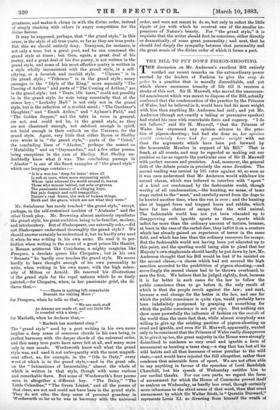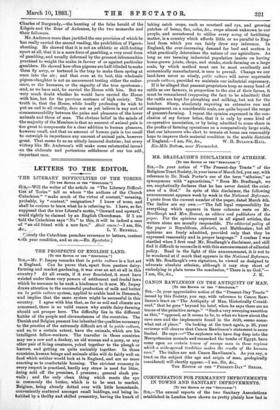THE BILL TO PUT DOWN PIGEON-SHOOTING.
THE discussion on Mr. Anderson's excellent Bill entirely verified our recent remarks on the extraordinary power exerted ,by the leaders of Fashion to give the coup de grcice to a practice that is morally discreditable, and yet which shows enormous tenacity of life till it receives a stroke of this sort. Sir H. Maxwell, who moved the unsuccess- ful amendment which was meant to dispose of the Bill, actually confessed that the condemnation of the practice by the Princess of Wales, had he believed in it, would have had far more weight with him than anything Mr. Anderson had said ; and yet Mr. Anderson (though not exactly a taking or persuasive speaker) had stated his case with remarkable force and cogency. "I do not believe," said Sir H. Maxwell, "that the Princess of Wales has expressed any opinion adverse to the prac- tice of pigeon-shooting ; but had she done so, her opinion, would certainly hare had far greater weight with me than the arguments which have been put forward by the honourable Member in support of his Bill." That is frank, at all events, and may be regarded as making out our position so far as regards the particular case of Sir H. Maxwell with perfect success and precision. And, moreover, the general drift of the debate points in precisely the same direction. The second reading was carried by 195 votes against 40, so soon as it was once understood that Mr. Anderson would withdraw his second clause, which was believed to interfere with " sport " of a kind not condemned by the fashionable world, though worthy of all condemnation,—the hunting, we mean, of tame stags carted to the " meet," and carefully saved from the dogs to be hunted another time, when the run is over ; and the hunting also of bagged foxes and trapped hares and rabbits, which have far less chance of escape than tbo wild animal. The fashionable world has not yet been educated up to disapproving such ignoble sports as these, sports which inflict far more than the ordinary amount of torture, because, at least in the case of the carted deer, they inflict it on a creature which has already gained an experience of terror in the same field, and which has less than the ordinary resources for escape. But the fashionable world not having been yet educated up to this point, and the sporting world being able to plead that her Majesty's own staghounds should hardly be put down by law, Mr. Anderson thought that his Bill would be lost if he insisted on the second clause,—a clause which had not secured the high sanction accorded to the prohibition of pigeon-shooting,—and accordingly the second clause had to be thrown overboard, to save the first. We believe that he judged rightly, first, because it is far better in such cases for the law to follow the public conscience than to go before it, the only result of which is that the people revolt against the law ; and next, because a real change for the better in the law, and one for which the public conscience is quite ripe, would probably have been indefinitely postponed by grasping at something for which the public conscience is not yet ripe. But nothing can show more powerfully the influence of fashion on the 2)LOALIC of the world than the mere fact that, while almost everybody was willing to give up the existing pastime of pigeon-shooting as cruel and ignoble, and even Sir II. Maxwell, apparently, wanted only to be convinced that the Princess of Wales really disapproves it, to give it up too, the great majority in the House were strongly disinclined to condemn so very cruel and ignoble a form of amusement as hunting a tame stag,—a stag that has lost all its wild habits and all that keenness of sense peculiar to the wild state,—and would have rejected the Bill altogether, rather than condemn that miserable form of sport. We are not often able to say anything in favour of the speeches of Lord Randolph Churchill, but his speech of Wednesday entitles him to our cordial thanks. For our own parts, we regard the form of amusement for which the House of Commons proved itself so zealous on Wednesday, as hardly less cruel, though certainly more inhumane in the strict sense of that word, than that cruel amusement by which Sir Walter Sdott, in" Quentin Durward," represents Louis XL as diverting from himself the wrath of
'Charles of Burgundy,—the hunting of the false herald of the Liegois and the Boar of Ardennes, by the two monarchs and their followers.
Mr. Anderson more than justified the one provision of which he has really carried the second reading, the prohibition of Pigeon. shooting. He showed that it is not an athletic or skill-testing :sport at all, that it is a mere form of gambling, a very cruel form -of gambling, and usually deformed by the grossest inhumanities practised to weight the scales in favour of or against particular ;.gamblers. He showed how often pigeons are half-blinded to make them fly awry, or tortured in the trap to make them spring at "once into the air ; and that even at its best, this wholesale pigeon-slaughter is not an amusement testing either the endur- ance, or the keenness, or the sagacity of the true sportsman ; :and, as we have said, he carried the House with him. But we -very much doubt whether he would have carried the House with him, but for the previous sentence of high society. The 'truth is, that the House, while loudly professing its wish to put an end to all cruelty, does not as yet believe in any sort of .commensurability between the pains and pleasures of the lower -animals and those of man. The obvious belief in the minds of the majority of the Members is that no amount of animal pain is too great to compensate for a clear addition to human pleasure, however small, and that no amount of human pain is too small to outweigh in importance any amount of animal pain, however :great. That seems to us an utterly immoral doctrine ; but every victory like Mr. Anderson's will make some substantial inroad on the obdurate and portentous selfishness of our too self-, important race.



































 Previous page
Previous page